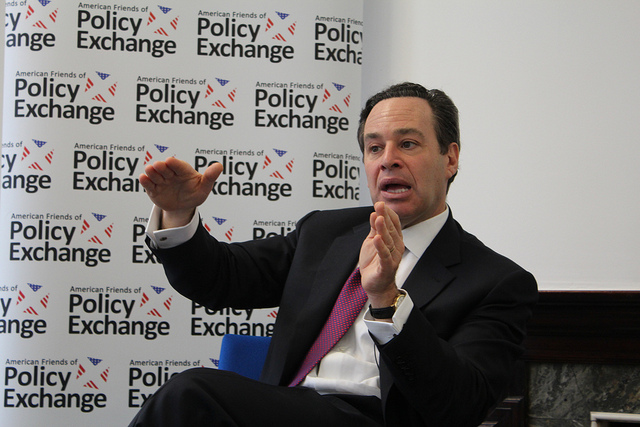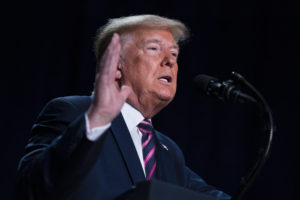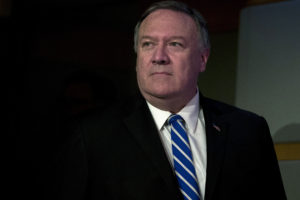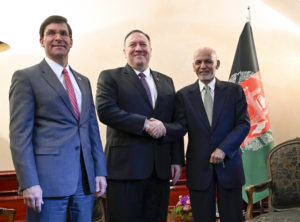Neoconservatives Are Ascendant in Donald Trump’s America
The Weekly Standard may be dead, but neocons enjoy new influence in both parties, writes Stephen Wertheim in The New York Review of Books. David Frum, former speechwriter for George W. Bush and senior editor for The Atlantic. (Policy Exchange / Flickr)
David Frum, former speechwriter for George W. Bush and senior editor for The Atlantic. (Policy Exchange / Flickr)
In December, after a 23-year run that saw it perpetuate the Bush administration lie that Saddam Hussein harbored weapons of mass destruction and breathlessly champion the ensuing war in Iraq, The Weekly Standard released its final issue. Two years removed from Donald Trump’s victory in the 2016 election, one might be forgiven for having concluded the publication’s demise sounded the final death knell of neoconservatism—an ideology that has been roundly defeated at the polls and appears to lack even a constituency, the ubiquity of Bill Kristol on cable news notwithstanding.
If only. As Stephen Wertheim argues in The New York Review of Books, the neoconservatives are ascendant in Trump’s America, reasserting themselves within GOP and, more troublingly, renewing their ties to the Democratic Party. Together they constitute the “neo-neoconservatives” or “post-neoconservatives,” as he’s dubbed them.
“Today, neoconservatives are riding high once more, in the White House, on Capitol Hill, in the most prominent organs of opinion,” Wertheim writes. “The Weekly Standard may have shuttered, but anti-Trump neocons enjoy increasing influence in the center of the Republican and Democratic parties and in publications like The Atlantic and The Washington Post.”
In his essay, Wertheim traces the history of the movement from World War II through the Cold War and up to 9/11, which allowed Kristol and Commentary’s Norman Podhoretz, among others, to forge an existential threat in the form of “Islamofascism.” Indeed, neoconservatism draws from the philosophical tradition of Leo Strauss, who wrote in the “The City and Man” that “the crisis of the West consists in the West’s having become uncertain of its purpose.” For the Straussians and their intellectual descendants, military conflict offered that sense of purpose, whether the enemy was Nazi Germany, Soviet Russia or Al-Qaeda.
Trump’s presidency has proved a clarifying moment. “[He] has forced neoconservatives to decide, for the first time, whether they are more against ‘totalitarianism’ or ‘globalism,'” continues Wertheim. “If anti-totalitarians take Trump to be perverting what they hold dear, anti-globalist neocons have found in Trump a kindred spirit and vehicle for power. Yet, even as they are fracturing, neocons are flourishing. They have bypassed the political wilderness and vaulted themselves to the vanguard on either side of the Trump divide.”
Within Trump’s cabinet, neoconservatism remains represented by national security adviser John Bolton, who has served in every Republican administration since Ronald Reagan. Wertheim contends that while right-wing non-interventionism is typically attributed to paleoconservatives like Pat Buchanan, neoconservatives have also historically taken aim at global institutions, if not globalism itself. Few have embodied this notion more than Bolton, who has made a career of bashing both the United Nations and its Security Council. During the Obama administration, Wertheim notes, he regularly sounded the alarm that “leftists like Obama were attempting to give away American sovereignty, bit by bit, to international bodies.”
“For Bolton and company, Donald Trump turned out to be a deliverance,” he observes. “Trump elevated ‘globalism’ from a marginal slur to the central foil of American foreign policy and Republican politics.”
Which brings us to neoconservatives’ suddenly lofty perch outside of the Trump administration. For Republican apostates like Jennifer Rubin, David Frum and Max Boot, Wertheim contends, the president has offered the “next best thing” to a foreign dictator: “an enemy within.” His personal degeneracy and unabashed corruption have allowed them to “reclaim their preferred role as the moral truth-tellers in America.”
“More surprising, perhaps, is that Democrats and outlets of the anti-Trump resistance have welcomed these neocons into their fold,” Wertheim observes. “Boot, Kristol, Rubin, and former advisers of George W. Bush and Senator John McCain appear daily on MSNBC to excoriate Trump and Trumpism. David Frum, who coined the ‘axis of evil’ as George W. Bush’s speechwriter, earns resistance retweets by warning of ‘this hour of liberal peril’ in The Atlantic. In 2017, The New York Times hired Bret Stephens from The Wall Street Journal in an effort to ‘broaden the range of Times debate about consequential questions,’ a curious rationale given that Stephens represented just the kind of Never Trump pundit repudiated by GOP voters and did nothing to change the op-ed page’s lack of a single Trump-supporting columnist.”
Ultimately, this embrace extends beyond pundits like Boot offering foreign policy advice to the party’s leadership. Even purportedly liberal think tanks like the Center for American Progress are partnering with the right-wing American Enterprise Institute. The question is why, decades removed from Sen. Henry Martin “Scoop” Jackson and the fall of the Berlin Wall, neoconservatives once again feel at home within the Democratic Party? Wertheim’s conclusions are as credible as they are dispiriting.
“What best explains centrist Democrats’ rapprochement with neoconservatives isn’t an anti-Trump strategy but rather a genuine affinity with their current political objectives and style,” he writes. “Neocons have spent decades reducing politics to an all-encompassing crisis, a Manichean struggle between an imperiled liberal democracy and a pervasive totalitarian menace. Now certain liberals see things in much the same way. Lionizing the neocons indulges these Democrats’ fantasy that respectable Republicans will rise up to sweep Trump and all he stands for onto the ash heap of history.”
Read Wertheim’s essay at The New York Review of Books.
Your support is crucial…With an uncertain future and a new administration casting doubt on press freedoms, the danger is clear: The truth is at risk.
Now is the time to give. Your tax-deductible support allows us to dig deeper, delivering fearless investigative reporting and analysis that exposes what’s really happening — without compromise.
Stand with our courageous journalists. Donate today to protect a free press, uphold democracy and unearth untold stories.






You need to be a supporter to comment.
There are currently no responses to this article.
Be the first to respond.